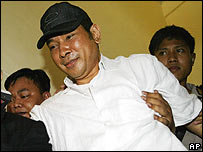skip to main |
skip to sidebar
 The son of Indonesia's former President Suharto has been freed from jail on conditional release after serving only four years of a murder sentence.
The son of Indonesia's former President Suharto has been freed from jail on conditional release after serving only four years of a murder sentence.
Hutomo Mandala Putra, also known as Tommy, was given a 15-year sentence in 2002 following his conviction for ordering the killing of a judge.
His sentence was first cut to 10 years, and then reduced further.
Human rights activists and anti-corruption campaigners have voiced strong opposition to his release
Scuffles broke out as he was driven from the prison in east Jakarta.
His van was surrounded by dozens of reporters and photographers as he left for the prosecutor's office, where his release was made official.
'State of law'
Officials said Tommy Suharto was eligible for release after receiving his most recent sentence reduction along with thousands of other prisoners to mark Eid al-Fitr, the end of the holy Muslim month of Ramadan.
Under Indonesian law, prisoners who have shown good conduct and have served more than two-thirds of their sentence once the remissions are taken into account are eligible for parole.
Vice President Yusuf Kalla rejected criticism that the Indonesian authorities were favouring him because of his family connections.
"This is a state of law," he told reporters. "Once he completes his sentence ... he should be released."
Officials said he would remain on parole for a year.
A leading Indonesian human rights lawyer, Johnson Pandjaitan, said it was wrong to view the release as automatic.
"Conditional release is never automatic. Nothing is really automatic. It should go through a certain process," he told Reuters news agency.
Embezzlement charges
The 44-year-old former playboy was found guilty in 2002 on charges of murder, weapons possession and evading justice.
He was convicted of masterminding the assassination of Supreme Court Judge Syafiuddin Kartasasmita who was shot dead by gunmen on a motorcycle.
Judge Kartasasmita had himself convicted Tommy for corruption and illegal possession of weapons.
Tommy's father Suharto stepped down in 1998 amid an economic crisis and rising discontent.
The 84-year-old ailing former leader is accused of embezzling millions of dollars in state funds during his three decades in power, a charge he denies.
 By Arijit Ghosh
By Arijit Ghosh
Oct. 24 (Bloomberg) -- U.S. President George W. Bush will travel to Indonesia, which has the world's largest Muslim population, and Singapore next month when he attends the 14th Asia-Pacific Economic Cooperation Leaders meeting in Vietnam.
Bush will be in Hanoi for the meeting on Nov. 18 and Nov. 19, the White House said yesterday in a statement posted on its Web site.
Bush's visit to Indonesia will be the culmination of high- level Western leaders meeting President Susilo Bambang Yudhoyono in Jakarta this year. The U.S. has described Indonesia as a ``voice of moderation in the Islamic world'' and that nation's Secretary of State Condoleezza Rice visited the country on March 15. Her visit was followed by Tony Blair, the first British prime minister to visit Indonesia since Margaret Thatcher in 1985.
Yudhoyono, Indonesia's first directly elected president, has cracked down on terrorism and corruption and last year signed a peace accord with rebels in the western province of Aceh, ending a conflict that killed more than 12,000 people in nearly three decades of fighting.
 JAKARTA, Indonesia, Oct. 8 -- Human rights groups on Sunday criticized Indonesia's Supreme Court for overturning the 14-year prison sentence of a man convicted of killing the country's most prominent activist.
JAKARTA, Indonesia, Oct. 8 -- Human rights groups on Sunday criticized Indonesia's Supreme Court for overturning the 14-year prison sentence of a man convicted of killing the country's most prominent activist.
Munir Said Thalib, a human rights lawyer who was threatened in the late 1990s after revealing abuses by the Indonesian military, died of arsenic poisoning in September 2004 on a flight from Jakarta to Amsterdam.
The Supreme Court said last Tuesday that it had seen insufficient evidence to support a decision by a lower tribunal that an off-duty pilot, Pollycarpus Budihari Priyanto, had laced Munir's food with poison.
The acquittal has angered many in Indonesia, where the case was seen as a test for a legal system still plagued by corruption after nearly three decades under dictator Suharto. The Suharto government, toppled by a popular uprising in 1998, was known for imprisoning and killing its political opponents.
"The failure to secure a conviction for Munir's murder is a huge blow for human rights protection and the reform process supposedly underway in Indonesia," Brad Adams, Asia director for the New York-based group Human Rights Watch, said in a recent statement.
Munir's wife, Suciwati, who like many Indonesians goes by a single name, maintains that the killing was the result of a conspiracy by military intelligence officials angered by her husband's activism.
She has said the key to Munir's case lies in a trove of telephone taps between a high-ranking Indonesian general and the pilot, which the intelligence service refuses to make public.
That theory was supported by Asmara Nababan, an Indonesian human rights activist and member of the fact-finding team established by the government last year to probe the case. The team concluded that Priyanto had had contact with an agent from Indonesia's intelligence agency, information that never surfaced in court.
 The son of Indonesia's former President Suharto has been freed from jail on conditional release after serving only four years of a murder sentence.
The son of Indonesia's former President Suharto has been freed from jail on conditional release after serving only four years of a murder sentence.


